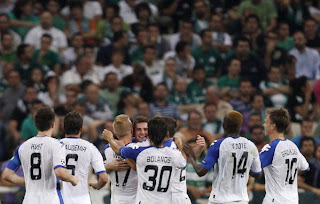 |
| Wilkinson kicked England to World Cup glory |
English Rugby lost of the finest players of a generation yesterday when Jonny Wilkinson announced his retirement from test rugby. The mercurial Fly-Half will no doubt forever be remembered for that drop goal in Sydney in 2003, bringing the World Cup back to these shores after defeating hosts Australia in the final.
However he was much more than that. From a young age he was tipped for the very top, while his training routines, and more importantly kicking practises, are notorious. He was not only a tremendous goal kicker, the best for many years, his offensive distribution was also second to none whilst defensively he was equally as solid. Just hear some of the stories from opponents he has faced over the years, he was an all round Fly-Half, arguably transforming the position with each performance.
It was no coincidence that when he was playing his best rugby so were England, just cast your mind back to a shoulder that was once in full working order. Some of the performances he has put in over the years have just been immense, and it is justified that many people connected to the game have been falling over themselves to heap praise on the Toulon star.
Lewis Moody, an ex international team mate, said to Radio 5 live:
"Jonny is one of the most professional individuals I have ever worked with.
"He put everything into what he did, it was incredible to watch him."
He added: "It's a real shame he's decided to retire, but what he's given to English rugby is immense.
"He was ferocious in the tackle, it was one of the things that made him so special at fly-half.
"He brought his own mark to the fly-half role, and he dedicated himself to being the best he could be.
"It was inspiring to train with him, he was a very controlled
player, a calming influence on the pitch - I was privileged to play on
the same pitch as him."
Clive Woodward, who handed Wilkinson his international debut in 1998, was equally as complimentary, telling the BBC: "The way he defended and attacked, he was a very special player.
 |
| In action for club side Toulon |
"All of us involved in that team [in 2003] just felt very lucky and privileged to have had him around at that time.
"He would have taken the decision to retire very seriously
but he will still be playing for Toulon, and he has been playing very
well for Toulon.
"I'd just like to say well done to him. He has done so much
for not just English rugby but also world rugby on the field, and
especially off the field."
Woodward went on to talk about the injury problems Wilkinson suffered in the latter stages of his international career, adding: Every player has injuries and he probably had more than his fair share but that was the way he played the game.
"I remember trying to keep him out of rucks so many times and
trying to keep him out of contact but that wasn't him, he wanted to get
involved.
"He would smash into rucks and that was because he wanted to be a real team player.
"He has had a long career. He came into the side when he was
18 and this is the end of an era and it is perhaps fitting that we move
on from that era now."
With Stuart Lancaster now taking temporary charge of the international fold, supported by Graham Rowntree and Andy Farrell, perhaps the time was right to call time. It in no doubt the end of an era, but now the team can progress with eyes towards the 2015 World Cup and hopefully a new golden age for English Rugby. It won't be easy to find the next Wilkinson, but that is what the new management team are charged with.
Whilst there is now only one real winner with the announcement of the news. French club Toulon be the recipients of Wilkinson's undivided attention.







